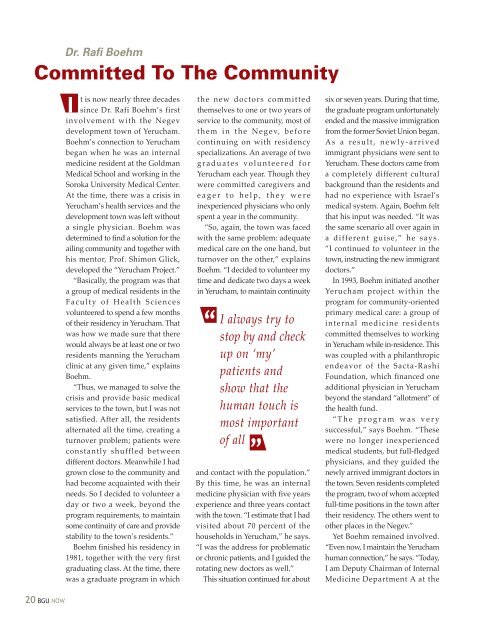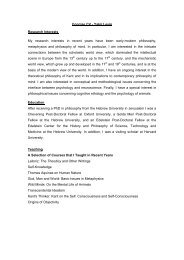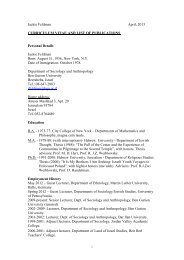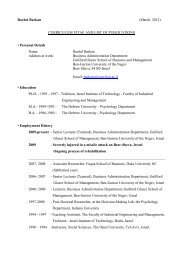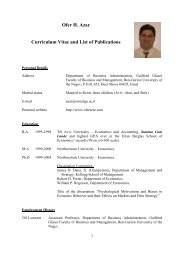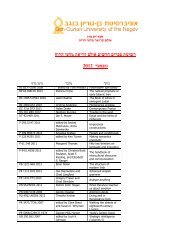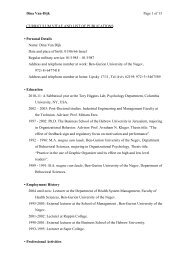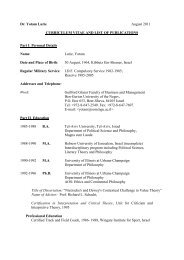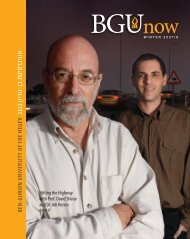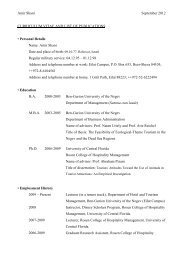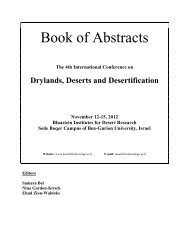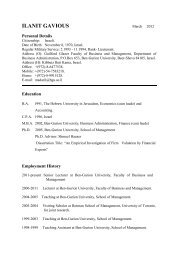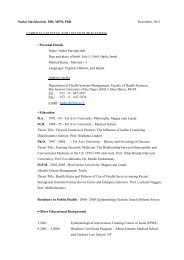cover 2006
cover 2006
cover 2006
You also want an ePaper? Increase the reach of your titles
YUMPU automatically turns print PDFs into web optimized ePapers that Google loves.
Dr. Rafi Boehm<br />
Committed To The Community<br />
20 BGU NOW<br />
I<br />
t is now nearly three decades<br />
since Dr. Rafi Boehm’s first<br />
involvement with the Negev<br />
development town of Yerucham.<br />
Boehm’s connection to Yerucham<br />
began when he was an internal<br />
medicine resident at the Goldman<br />
Medical School and working in the<br />
Soroka University Medical Center.<br />
At the time, there was a crisis in<br />
Yerucham’s health services and the<br />
development town was left without<br />
a single physician. Boehm was<br />
determined to find a solution for the<br />
ailing community and together with<br />
his mentor, Prof. Shimon Glick,<br />
developed the “Yerucham Project.”<br />
“Basically, the program was that<br />
a group of medical residents in the<br />
Faculty of Health Sciences<br />
volunteered to spend a few months<br />
of their residency in Yerucham. That<br />
was how we made sure that there<br />
would always be at least one or two<br />
residents manning the Yerucham<br />
clinic at any given time,” explains<br />
Boehm.<br />
“Thus, we managed to solve the<br />
crisis and provide basic medical<br />
services to the town, but I was not<br />
satisfied. After all, the residents<br />
alternated all the time, creating a<br />
turnover problem; patients were<br />
constantly shuffled between<br />
different doctors. Meanwhile I had<br />
grown close to the community and<br />
had become acquainted with their<br />
needs. So I decided to volunteer a<br />
day or two a week, beyond the<br />
program requirements, to maintain<br />
some continuity of care and provide<br />
stability to the town’s residents.”<br />
Boehm finished his residency in<br />
1981, together with the very first<br />
graduating class. At the time, there<br />
was a graduate program in which<br />
the new doctors committed<br />
themselves to one or two years of<br />
service to the community, most of<br />
them in the Negev, before<br />
continuing on with residency<br />
specializations. An average of two<br />
graduates volunteered for<br />
Yerucham each year. Though they<br />
were committed caregivers and<br />
eager to help, they were<br />
inexperienced physicians who only<br />
spent a year in the community.<br />
“So, again, the town was faced<br />
with the same problem: adequate<br />
medical care on the one hand, but<br />
turnover on the other,” explains<br />
Boehm. “I decided to volunteer my<br />
time and dedicate two days a week<br />
in Yerucham, to maintain continuity<br />
I always try to<br />
stop by and check<br />
up on ‘my’<br />
patients and<br />
show that the<br />
human touch is<br />
most important<br />
of all<br />
and contact with the population.”<br />
By this time, he was an internal<br />
medicine physician with five years<br />
experience and three years contact<br />
with the town. “I estimate that I had<br />
visited about 70 percent of the<br />
households in Yerucham,” he says.<br />
“I was the address for problematic<br />
or chronic patients, and I guided the<br />
rotating new doctors as well.”<br />
This situation continued for about<br />
six or seven years. During that time,<br />
the graduate program unfortunately<br />
ended and the massive immigration<br />
from the former Soviet Union began.<br />
As a result, newly-arrived<br />
immigrant physicians were sent to<br />
Yerucham. These doctors came from<br />
a completely different cultural<br />
background than the residents and<br />
had no experience with Israel’s<br />
medical system. Again, Boehm felt<br />
that his input was needed. “It was<br />
the same scenario all over again in<br />
a different guise,” he says.<br />
”I continued to volunteer in the<br />
town, instructing the new immigrant<br />
doctors.”<br />
In 1993, Boehm initiated another<br />
Yerucham project within the<br />
program for community-oriented<br />
primary medical care: a group of<br />
internal medicine residents<br />
committed themselves to working<br />
in Yerucham while in-residence. This<br />
was coupled with a philanthropic<br />
endeavor of the Sacta-Rashi<br />
Foundation, which financed one<br />
additional physician in Yerucham<br />
beyond the standard “allotment” of<br />
the health fund.<br />
“The program was very<br />
successful,” says Boehm. “These<br />
were no longer inexperienced<br />
medical students, but full-fledged<br />
physicians, and they guided the<br />
newly arrived immigrant doctors in<br />
the town. Seven residents completed<br />
the program, two of whom accepted<br />
full-time positions in the town after<br />
their residency. The others went to<br />
other places in the Negev.”<br />
Yet Boehm remained involved.<br />
“Even now, I maintain the Yerucham<br />
human connection,” he says. “Today,<br />
I am Deputy Chairman of Internal<br />
Medicine Department A at the


